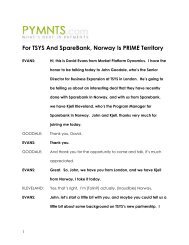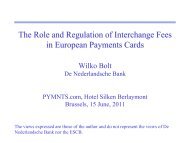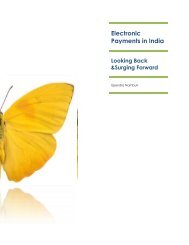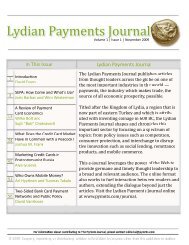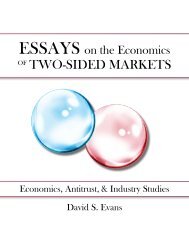- Page 3 and 4: Interchange FeesThe Economics and R
- Page 8 and 9: vi INTERCHANGE FEESaround the world
- Page 10 and 11: 2 INTERCHANGE FEESI. INTRODUCTIONIn
- Page 12 and 13: 4 INTERCHANGE FEESin the United Kin
- Page 14 and 15: 6 INTERCHANGE FEESwe believe are ro
- Page 16 and 17: 8 INTERCHANGE FEESpricing in which
- Page 18 and 19: 10 INTERCHANGE FEESmaximizing price
- Page 20 and 21: 12 INTERCHANGE FEESmerchants or wit
- Page 22 and 23: 14 INTERCHANGE FEESrelative to the
- Page 24: 16 INTERCHANGE FEESneed to balance
- Page 28 and 29: 20 INTERCHANGE FEESThe existing lit
- Page 30 and 31: 22 INTERCHANGE FEESE. ImplicationsT
- Page 32 and 33: 24 INTERCHANGE FEESstructure that i
- Page 34 and 35: 26 INTERCHANGE FEESvalidity. There
- Page 36: 28 INTERCHANGE FEEScards has not ch
- Page 39: The Economics of Interchange Fees a
- Page 44 and 45: 36 INTERCHANGE FEES• did not ensu
- Page 46 and 47: 38 INTERCHANGE FEESstriking that wh
- Page 48 and 49: 40 INTERCHANGE FEEScompleted. Witho
- Page 50 and 51: 42 INTERCHANGE FEESto be beneficial
- Page 52 and 53: 44 INTERCHANGE FEESin the 2000s. Mu
- Page 54 and 55: 46 INTERCHANGE FEESStaff economist
- Page 56 and 57: 48 INTERCHANGE FEESprices that are
- Page 58: 50 INTERCHANGE FEESwelfare, to set
- Page 61 and 62: The Economic Principles for Establi
- Page 63 and 64: The Economic Principles for Establi
- Page 65 and 66: chapter 3THE EFFECT OF REGULATORYIN
- Page 67 and 68: interchange Fee Capping in Australi
- Page 69 and 70: interchange Fee Capping in Australi
- Page 71 and 72: interchange Fee Capping in Australi
- Page 73 and 74: interchange Fee Capping in Australi
- Page 75 and 76: interchange Fee Capping in Australi
- Page 77 and 78: interchange Fee Capping in Australi
- Page 79 and 80: interchange Fee Capping in Australi
- Page 82 and 83: 74 INTERCHANGE FEESTABLE 4:Annual g
- Page 84 and 85: 76 INTERCHANGE FEESWe describe the
- Page 86 and 87: 78 INTERCHANGE FEESFIGURE 3:Share o
- Page 88 and 89: 80 INTERCHANGE FEESreduction in car
- Page 90 and 91:
82 INTERCHANGE FEESMore specificall
- Page 92 and 93:
84 INTERCHANGE FEESThe RBA also rep
- Page 94 and 95:
chapter 4ECONOMIC ANALYSIS OF THEEF
- Page 96 and 97:
88 INTERCHANGE FEESAccording to our
- Page 98 and 99:
90 INTERCHANGE FEESII. BACKGROUNDTh
- Page 100 and 101:
92 INTERCHANGE FEESUnder the propos
- Page 102 and 103:
94 INTERCHANGE FEESThey also provid
- Page 104 and 105:
96 INTERCHANGE FEESThe decision by
- Page 106 and 107:
98 INTERCHANGE FEESTable 4:Comparis
- Page 108 and 109:
100 INTERCHANGE FEEScard transactio
- Page 110 and 111:
102 INTERCHANGE FEESequal, by betwe
- Page 112 and 113:
104 INTERCHANGE FEESTABLE 6: HHI Me
- Page 114 and 115:
106 INTERCHANGE FEESTABLE 7:Checkin
- Page 116 and 117:
108 INTERCHANGE FEES• Online bank
- Page 118 and 119:
110 INTERCHANGE FEESCash back at th
- Page 120 and 121:
112 INTERCHANGE FEESofferings for a
- Page 122 and 123:
114 INTERCHANGE FEESbanks and credi
- Page 124 and 125:
116 INTERCHANGE FEEStransactions we
- Page 126:
118 INTERCHANGE FEESA 1995 study by
- Page 129 and 130:
Economic Analysis of Federal Reserv
- Page 131 and 132:
Economic Analysis of Federal Reserv
- Page 133 and 134:
Economic Analysis of Federal Reserv
- Page 135 and 136:
Economic Analysis of Federal Reserv
- Page 137 and 138:
Economic Analysis of Federal Reserv
- Page 139 and 140:
chapter 5HOW CHANGES IN PAYMENT CAR
- Page 141 and 142:
Economic Analysis of Interchange Fe
- Page 143 and 144:
Economic Analysis of Interchange Fe
- Page 145 and 146:
Economic Analysis of Interchange Fe
- Page 147 and 148:
Economic Analysis of Interchange Fe
- Page 149 and 150:
Economic Analysis of Interchange Fe
- Page 151 and 152:
Economic Analysis of Interchange Fe
- Page 153 and 154:
Economic Analysis of Interchange Fe
- Page 155 and 156:
Economic Analysis of Interchange Fe
- Page 157 and 158:
Economic Analysis of Interchange Fe
- Page 160 and 161:
152 INTERCHANGE FEESleads to an off
- Page 162 and 163:
154 INTERCHANGE FEESacquirers would
- Page 164 and 165:
156 INTERCHANGE FEESBased on this a
- Page 166 and 167:
158 INTERCHANGE FEESTable 2:Annual
- Page 169 and 170:
Economic Analysis of Interchange Fe
- Page 171 and 172:
Economic Analysis of Interchange Fe
- Page 173 and 174:
Payments Innovation and Interchange
- Page 175:
Payments Innovation and Interchange
- Page 178 and 179:
170 INTERCHANGE FEEScredit cards. T
- Page 180 and 181:
172 INTERCHANGE FEESGenerally there
- Page 182 and 183:
174 INTERCHANGE FEESThe merchant-pa
- Page 184 and 185:
176 INTERCHANGE FEESmand conditiona
- Page 186 and 187:
178 INTERCHANGE FEESis determined b
- Page 188 and 189:
180 INTERCHANGE FEESnumbers of merc
- Page 190 and 191:
182 INTERCHANGE FEESfor example—t
- Page 192 and 193:
184 INTERCHANGE FEESV. CONCLUSIONCo
- Page 194 and 195:
186 INTERCHANGE FEESI. INTRODUCTION
- Page 196 and 197:
188 INTERCHANGE FEES• It is not t
- Page 198 and 199:
190 INTERCHANGE FEESin May 2009. 17
- Page 200 and 201:
192 INTERCHANGE FEESthere is only o
- Page 202 and 203:
194 INTERCHANGE FEES• It is uncle
- Page 204 and 205:
196 INTERCHANGE FEESPIN debit inter
- Page 206 and 207:
198 INTERCHANGE FEESas a method of
- Page 208 and 209:
200 INTERCHANGE FEESThe debit cards
- Page 210 and 211:
202 INTERCHANGE FEESTable 2:BankRBC
- Page 212 and 213:
204 INTERCHANGE FEESkind of highly
- Page 215 and 216:
CONTRIBUTORSHoward ChangPrincipal w
- Page 217 and 218:
BIBLIOGRAPHYAckerberg, Daniel A., a
- Page 219 and 220:
Bibliography 211Chakravorti, Sujit
- Page 221 and 222:
Bibliography 213Gans, Joshua S., an
- Page 223 and 224:
Bibliography 215Katz, Michael L., a
- Page 225 and 226:
Bibliography 217Rochet, Jean-Charle
- Page 228:
Interchange FeesThe Economics and R



